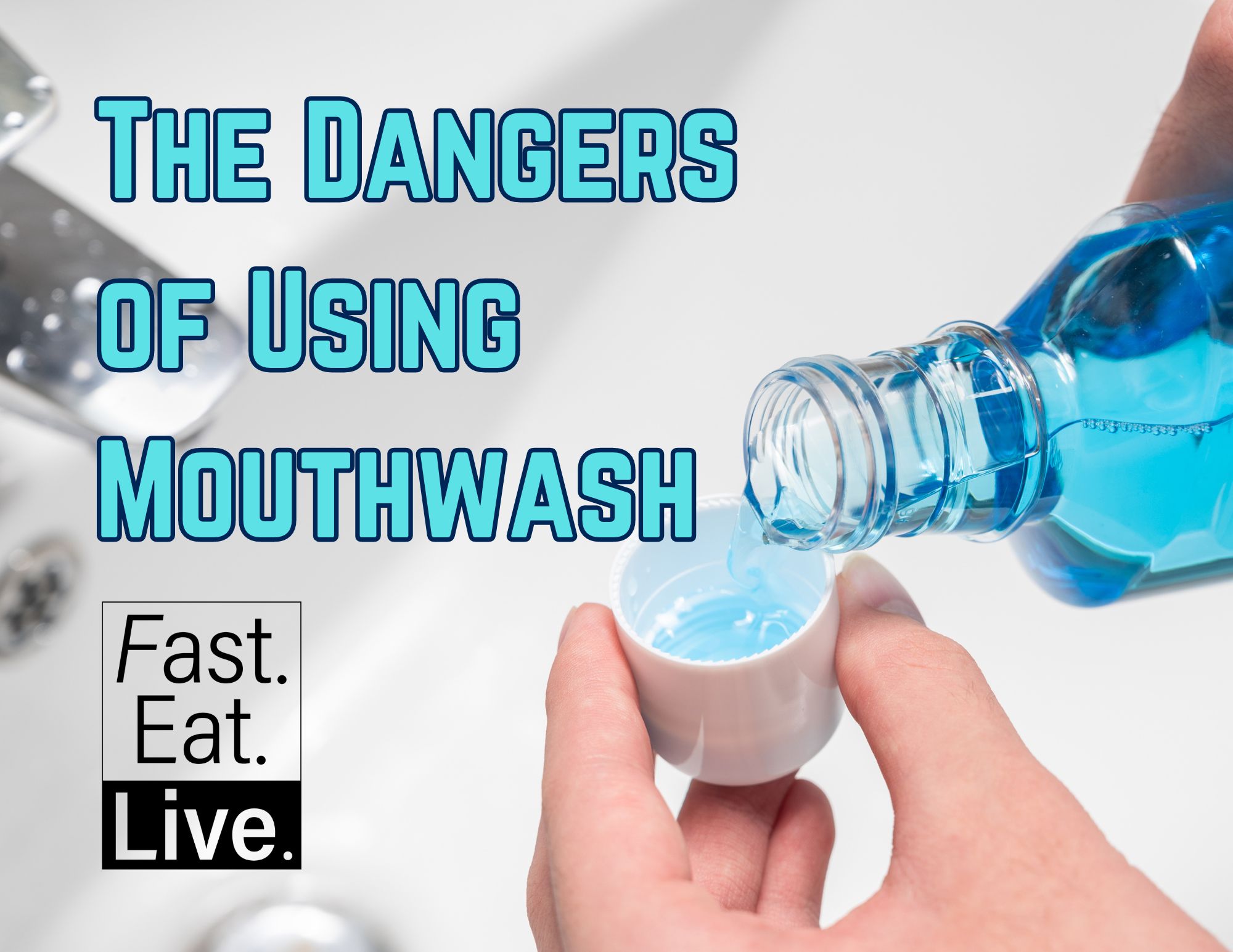The Dangers of Using Mouthwash:
Disrupting the Natural Bacteria in Your Mouth
Mouthwash, often marketed as a key to fresh breath and oral hygiene, has recently come under scrutiny for its potential harmful effects. While these antiseptic rinses are designed to kill bacteria that cause bad breath and plaque, they don’t discriminate between harmful and beneficial bacteria. The indiscriminate use of mouthwash can disrupt the oral microbiome, affecting not only oral health but overall well-being.
The Oral Microbiome: Your Mouth’s Natural Defense System
The human mouth hosts billions of bacteria, many of which play crucial roles in maintaining health. These microbes are involved in breaking down food, supporting gum health, and producing nitric oxide (NO), a molecule vital for cardiovascular health. When mouthwash wipes out both beneficial and harmful bacteria, it disrupts this balance, which can lead to unintended consequences.
A healthy oral microbiome helps to convert dietary nitrates (found in leafy greens and other vegetables) into nitrite and ultimately into nitric oxide, a compound critical for maintaining healthy blood pressure. Studies have shown that mouthwashes containing ingredients like chlorhexidine and alcohol can impair this process by killing off nitrate-reducing bacteria, which can lead to increased blood pressure (Oxford Academic), (Bristle).
Nitric Oxide, Blood Pressure, and the Oral Microbiome
Nitric oxide is not just a critical molecule for cardiovascular function; it also helps regulate blood pressure by relaxing blood vessels. Research has found that the oral microbiome plays a key role in nitric oxide production. Specific bacteria such as Neisseria, Veillonella, and Rothia are responsible for converting dietary nitrates into nitric oxide (Dental Tribune USA), (Bristle).
When these bacteria are destroyed by regular use of antiseptic mouthwash, nitric oxide production declines, leading to increased blood pressure. A 2019 study found that participants who used chlorhexidine mouthwash experienced a significant rise in systolic blood pressure and a reduction in nitrate-reducing bacteria on the tongue (Oxford Academic). Moreover, a meta-analysis published in 2021 confirmed that long-term mouthwash use can lead to hypertension by reducing the diversity of oral bacteria (Bristle).
Beyond Blood Pressure: Mouthwash and Systemic Health
Oral health is a gateway to overall health, and disruption of the oral microbiome can have far-reaching effects. The oral cavity is intimately connected to both the gut and the brain via the gut-brain axis, and imbalances in oral bacteria can influence these other systems. Emerging research links poor oral health to cognitive decline, including the breakdown of the blood-brain barrier, which can contribute to conditions like Alzheimer’s disease (Bristle).
The mouth is also the beginning of the digestive tract, and imbalances in oral bacteria can lead to disruptions in the gut microbiome. Since the gut is where most of our immune cells are located, a dysregulated gut microbiome can impair immune function and increase the risk of systemic inflammation, which is linked to a range of chronic diseases.
Healthy Alternatives to Conventional Mouthwash
If mouthwash kills the bacteria that help maintain health, what are some healthier alternatives?
- Coconut Oil Pulling
Oil pulling, especially with coconut oil, is an ancient Ayurvedic practice that involves swishing oil around the mouth for 10–20 minutes. Coconut oil has natural antimicrobial properties, but unlike alcohol-based mouthwashes, it doesn’t wipe out the entire microbial community in the mouth. Studies suggest that oil pulling can reduce harmful bacteria like Streptococcus mutans, which are responsible for cavities, without destroying beneficial bacteria (Bristle).
- Natural, Alcohol-Free Mouthwash
Many natural mouthwashes are free of alcohol and harmful chemicals. Look for products that contain ingredients like xylitol, aloe vera, and essential oils like tea tree or peppermint, which have antibacterial properties but are less harsh on the oral microbiome.
- Saltwater Rinses (personal favorite after I bite my lip or get a cut)
A simple and effective alternative, saltwater rinses help to soothe inflammation and prevent infections without the harmful side effects associated with chemical mouthwashes. Saltwater can create an inhospitable environment for harmful bacteria while supporting gum health.
- Herbal Mouthwashes
Mouthwashes containing herbs like clove, neem, and licorice root have been used traditionally for their antibacterial and anti-inflammatory effects. They help promote gum health while preserving the delicate balance of oral bacteria.
Oral Health and Total Health
The health of your mouth is connected to the health of your entire body. Conditions like periodontal disease, which involves chronic inflammation of the gums, have been linked to heart disease, diabetes, and even certain cancers. Maintaining a healthy oral microbiome supports not just dental health but also the cardiovascular, immune, and neurological systems.
For example, the nitric oxide produced by oral bacteria is not only crucial for regulating blood pressure but also for overall cardiovascular health. Without adequate nitric oxide, blood vessels may become stiffer, leading to conditions like hypertension, which can increase the risk of heart attack or stroke. Furthermore, the role of oral bacteria in immune modulation cannot be overlooked. As we’ve seen, healthy bacteria help maintain a balance in the immune system, protecting against both infections and chronic inflammation (Bristle), (Dental Tribune USA).
How to Support Your Oral Microbiome
Supporting your oral microbiome involves more than avoiding mouthwash. Here are some ways you can promote a balanced oral ecosystem:
- Limit Sugary and Processed Foods: Sugar feeds harmful bacteria in the mouth, promoting cavities and gum disease. Reducing sugar intake can help maintain a healthier balance of bacteria.
- Eat Nitrate-Rich Vegetables: Leafy greens, beets, and other vegetables high in nitrates support nitric oxide production. The oral bacteria convert these nitrates into nitrite, which is then converted into nitric oxide.
- Practice Good Oral Hygiene: Regular brushing and flossing remove food particles and plaque without the need to kill off beneficial bacteria. Consider using a soft-bristled toothbrush to avoid damaging gum tissue.
- Hydrate: Drinking water helps wash away food particles and keeps the mouth’s pH balanced, which discourages harmful bacteria from proliferating.
- Regular Dental Checkups: Regular visits to the dentist can help catch early signs of gum disease and other issues that could disrupt the oral microbiome.
Take Away
While mouthwash may seem like a quick fix for fresh breath, the long-term consequences of using antiseptic rinses can be harmful. By disrupting the natural bacteria in the mouth, regular mouthwash use can raise blood pressure, reduce nitric oxide production, and increase the risk of chronic disease. Healthy alternatives like coconut oil pulling, natural mouthwashes, and saltwater rinses can help support oral health without destroying the delicate balance of beneficial bacteria.
In essence, oral health is not just about teeth and gums; it’s connected to cardiovascular health, immune function, and even brain health. By maintaining a healthy oral microbiome, we can support total body health.




